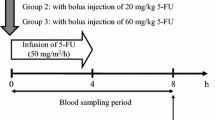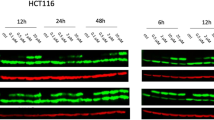Abstract
Dihydropyrimidine dehydrogenase (DPD) is a rate-limiting enzyme of (fluorinated) pyrimidine degradation that plays a significant role in the pharmacokinetics of 5-fluorouracil (5-FU). In addition, a catabolite of 5-FU induces a certain toxicity, and the sensitivity of 5-FU is determined by DPD activity in tumors. DPD is thus important clinically. Drugs have been developed that control variations of the pharmacokinetics of 5-FU by controlling or inhibiting DPD, thereby reducing toxicity and improving sensitivity. These fluorinated pyrimidines with DPD-inhibiting activity, called DPD-inhibitory fluoropyrimidines, contribute to oral therapy with 5-FU for cancer. This paper summarizes the important role of DPD in cancer chemotherapy with 5-FU.
Similar content being viewed by others
Author information
Authors and Affiliations
Corresponding author
About this article
Cite this article
Kubota, T. 5-Fluorouracil and dihydropyrimidine dehydrogenase. Int J Clin Oncol 8, 127–131 (2003). https://doi.org/10.1007/s10147-003-0319-7
Received:
Issue Date:
DOI: https://doi.org/10.1007/s10147-003-0319-7




